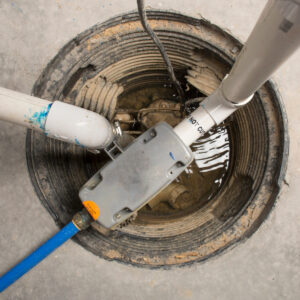Sump pumps are one of those things you never really think about as a homeowner. When installed properly, they just do their job and help prevent basement flooding. During the rainy spring and summer months, they easily pump water away from your home and help prevent flooding from rainwater seepage. The winter months, however, can become troublesome with freezing temperatures. Do you know how to prevent your sump pump line from freezing?
During the winter, you may assume sump pumps are given a break since large rainstorms are replaced with snow and cold temperatures. The truth is dropping temperatures can cause sump pump lines to become frozen and clogged with ice. Let’s take a look at what happens in a home when a discharge line freezes, tips to prevent frozen discharge lines, and what to do in the event your pipes do freeze.
What Happens When a Discharge Line Freezes
As soon as the weather takes a dip and temperatures go below 32 degrees Fahrenheit, water will freeze. The water in your sump pump discharge hose is not exempt from freezing temperatures. The discharge water will quickly turn to ice and your sump pump pipe can become clogged.
Ice can build up and make your sump pump work harder to move water away from your home. When it becomes completely clogged, the water has nowhere to go and your basement will start flooding. Even worse, your sump pump may continue to run and can overheat while trying to pump water out of your basement. Now you have two problems – a flooded basement AND a broken sump pump.
It’s incredibly important to prevent your sump pump from freezing over the wintertime by following a few tips and tricks.
Tips to Prevent Frozen Discharge Lines
When you are preparing your home for the harsh winter months in the mid-Atlantic region, don’t forget to pay attention to your sump pump and sump pump discharge line. Here are tips and steps to take to prevent frozen lines and subsequent flooding.
- Bury Discharge Pipe: The discharge pipe should be buried below the frost line. Soil acts as an insulator and soil doesn’t freeze as easily.
- Extend the Discharge Line: If burying the discharge line is not an option, extend the discharge line away from your home at a downward slope. In this method, gravity helps do the work by keeping water flowing. Flowing water freezes at a lower rate than standing water. Extend the line at least 20 feet away from your home’s foundation.
- Protect Discharge Pipe from Freezing Temperatures: Adding insulation around the discharge pipe can help prevent freezing. Use hay (a natural insulator) or a tarp to cover the line. Even better – use a freeze-resistant hose as part of your sump pump system.
- Keep the Water Running: As mentioned above, running water freezes at a slower rate than standing water. Keep the water running throughout your entire home to help prevent frozen pipes. If your interior plumbing starts to freeze, chances are your sump pump basement will freeze as well.
What to Do If the Pipes are Frozen
Even with proper prevention and knowing how to prevent your sump pump line from freezing, sometimes a cold spell can cause your sump pump to freeze. In this situation, your home is at risk of a flood. If your sump pump line is frozen, you have a few options. First, you can add additional insulation to the pipe, although this can take quite some time to thaw out the pipe and doesn’t always work.
Your best bet is to use a portable heater to thaw out frozen discharge pipes. Portable heaters provide a consistent source of heat and can thaw out the pipes to help prevent flooding. You can also bump up the heat in your basement to help defrost water in the line.
Outside of the house, inspect the discharge line and remove any blockages (ice, snow, or other debris). Clear the line as much as possible to promote water flow.
Water Damage Restoration Specialists
At Reynolds Restoration Services, we’ve seen basements become flooded in the wintertime due to frozen sump pump lines. A flooded basement can be hard to dry out completely on your own. Our team of emergency restoration professionals can help you address the issue and get your home or business back to its pre-loss condition quickly.
We are available 24 hours a day, 365 days a year to respond to emergencies. With offices in Harrisburg, Pa., Philadelphia, Pa., and the Baltimore, Md./Washington, D.C. region, we can be on-site at your home within hours. Let us take on the task of cleaning up your flooded basement – our goal is to respond and rebuild with care!

President of Reynolds Restoration Services. Over 20 years of experience in the emergency restoration industry.


